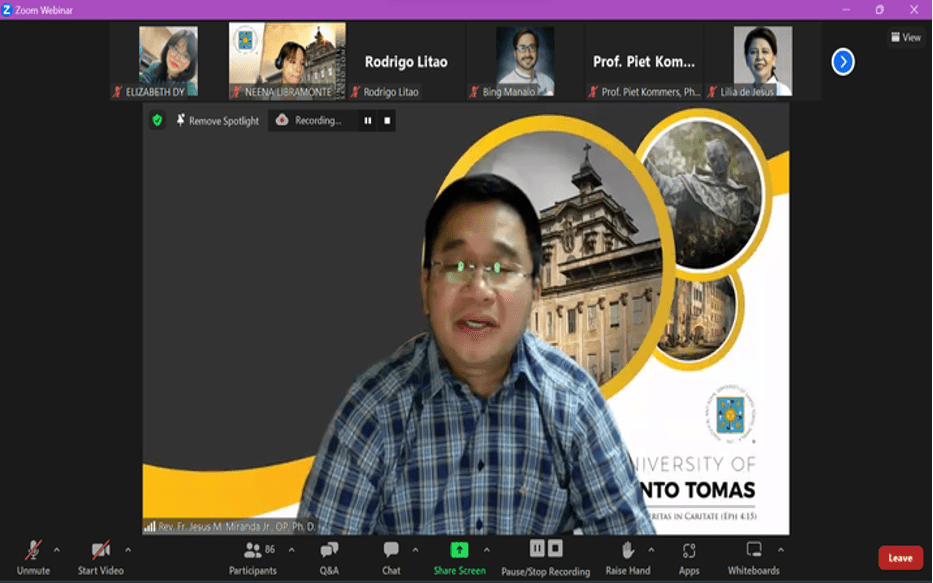The UST Graduate School Education Cluster held a webinar titled “Pedagogical Approaches: A Look into Demystifying Teaching with Artificial Intelligence (AI)” on November 30, 2023 via Zoom. This event brought together esteemed speakers, Professor Piet Kommers, a Professor of UNESCO Learning Technologies and the University of Twente in the Netherlands, and the Prior of the Priory of St. Thomas Aquinas Rev. Fr. Jesús M. Miranda, Jr, O.P., Ph.D.


Attended by over 100 participants spanning various sectors internationally, the webinar delved into AI through classroom methodologies and research-based strategies while examining potential challenges and ethical considerations related to AI in education.
Assoc. Prof. Rodrigo Litao, Ph.D. delivered the opening remarks highlighting how the advent of AI has raised questions about the authenticity of students’ work. Yet, he emphasized that AI is an integral part of our reality, urging us to embrace its potential to enhance students’ learning experiences without compromising their development of essential 21st-century skills.
It was soon followed by the discussion of Fr. Miranda, who focused on the profound impact of AI on education and the necessary adjustments to harness its potential. He emphasized that AI is a supportive tool, not a replacement for humans, advocating for a shift from Artificial Intelligence to Intelligence Augmentation. He stressed the imperative need to reframe our teaching methods, moving away from just finding the answers instead of focusing on asking the right questions. He also underscored the evolving role of educators, from being “the “sage on the stage” to being “the guides on the sides.” Furthermore, Fr. Miranda urged educators to have a more proactive approach in making technology a valuable tool for teaching and learning, and reconsidering how education utilizes and adapts technology and aim to stay ahead in an ever-evolving landscape
The second talk, delivered by Prof. Piet Kommers, discussed the development of AI and its profound impact on education. He traced AI’s birth in the 1960s to its current dominance in Machine Learning and deep learning applications, particularly in healthcare and education. Professor Kommers highlighted AI’s transformative role in reshaping educational structures, including curricula, assessments, and teaching methodologies.
Despite AI’s influence on education, Prof. Kommers urged educators to effectively integrate technology into the classroom, emphasizing that technology should only serve as a window to the world in which the teachers’ responsibility is to open and close it..
He also discussed AI’s role in grading and emphasized the need to secure and protect student data. He expressed the dreams of AI in education, which hopes for personalized and effective learning. Some of the fears about AI are potential creativity loss and deepening of social divides.
Identifying AI as a transformative force, Prof. Kommers urged the need for a strategic analysis of its integration into learning methodologies. He quoted Kenneth Dunn, underscoring teaching the students the way they learn.
It was also mentioned that while AI systems have advanced in various aspects, they still lack the capacity for subjective experiences, consciousness, and personal values. AI systems are programmed based on algorithms and trained on data, and they primarily provide objective analyses and responses based on patterns and rules. He stressed that AI cannot fully replicate the human-to-human interactions that facilitate deeper kind engagement and understanding since it may struggle to understand context, emotions, and deeply personal aspects of life.
Lastly, he emphasized three crucial elements for effective learning: understanding the learners’ culture and nature, recognizing technology’s impact on them, and advocating for a balanced approach between play and work. He highlighted the importance of playfulness in fostering creativity and future-proofing learning methods, cautioning against burnout caused by excessive focus on deadlines and hard work without room for creativity.
Following the lecture, the virtual floor welcomed questions from the participants which were openly answered by Prof. Kommers. Soon after, Assoc. Prof. Lilian De Jesus delivered the closing remarks. The webinar was organized by by students from the Teaching Models and Methodologies class under the supervision of Assoc. Prof. Lilian de Jesus.




